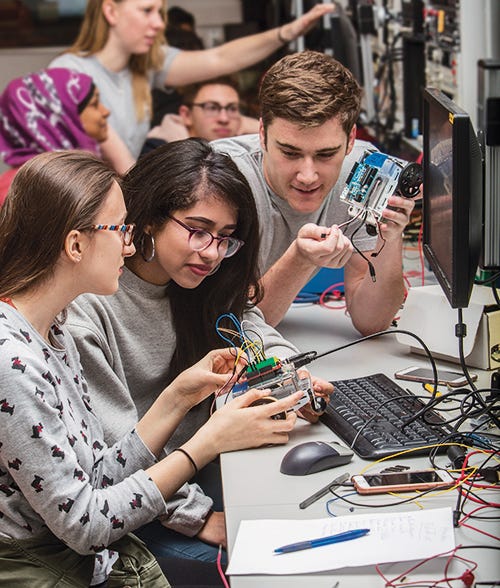Access Engineering

In order for the U.S. to remain globally competitive in technology and innovation, widening the pipeline of incoming engineers is critical. Despite booming numbers of education initiatives in STEM (science, technology, engineering and math), many students across the country continue to graduate from high school without a real grasp of the field of engineering or its career opportunities. This gap is particularly wide in rural and urban areas where STEM’s more costly educational resources can be harder to provide.
A number of Penn Engineering students identified this area of need and formed Access Engineering, allowing high school students throughout Philadelphia to experience firsthand what it means to major in engineering. Initiated in 2014 with a pilot program of 20 high school students, today the program boasts nearly 80 participants each semester and has provided more than 300 total students with the opportunity to explore the applied sciences, participate in specialized courses, and be exposed to Penn’s revolutionary laboratories and equipment.
“We have a very strong commitment to serving the Philadelphia area,” states Kyle DeLuca, current president of Access Engineering and junior in Chemical and Biomolecular Engineering. “We want to target schools that might not be able to expose students to the full breadth of engineering and to what being an engineer really involves. We feel that it’s very important for these students to know that becoming an engineer is an option that is truly open to them.”
COMMUNITY ACTION
Since its inception, Access Engineering has worked closely with schools including Northeast High School, Central High School, Julia R. Masterman School, and George Washington Carver High School of Engineering and Science (HSES) to recruit students interested in careers in STEM fields. As of the current academic year, Access Engineering has grown to offer eight-week sessions during both the fall and spring semesters, where participating students gather in the Penn Engineering complex for three hours each Saturday. Upon completion of their first session, many students opt to attend a second semester in order to receive more advanced instruction.
“I think hands-on labs with real-time equipment and the opportunity to experience a university campus encourage people to go to college,” says past president Kaylin Raby, a junior in Systems Science and Engineering. “That is the main value of our program, to give a glimpse at what it would be like to be an engineering major and just how much fun it really is.”
Begun by William Mannherz (BSE’16) and Rahul Gupta (BSE’16), Access Engineering is now the largest community service club at Penn Engineering. Thanks in large part to DeLuca and Raby, the organization has grown to more than 30 active Penn student volunteers, and was honored with the 2016 Engineering Student Activities Council (ESAC) Club of the Year distinction.
ENGINEERING ILLUMINATED
Currently, each eight-week session encompasses exercises from across a number of Penn Engineering’s undergraduate majors, teaching methods that can be applied to fields such as bioengineering and nanoscience. The student teachers brainstorm lessons from their own classroom experiences and create assignments for each of the workshops.
One of DeLuca’s favorite assignments for the students involves mechanical engineering concepts and using a computer program called SOLIDWORKS to design a 3D-printed catapult. Once the arm of the catapult is printed, students attach it to a base they design using LEGO bricks, and they compete against their peers to see who created the best arm and catapult, and who can fling the object farthest. As he explains, “It shows the students that they can understand and implement engineering ideas and that they can be successful.”

A senior at Northeast Magnet High School, Gina Lepore’s favorite part of the program was learning to use design software. After completing the Access Engineering program, Lepore decided to apply to Penn, was accepted and will begin as a freshman in the fall. She plans to major in Biology with a pre-med track in the College of Arts & Sciences and would like to take a class or two in coding. “My decision to go to Penn was strongly influenced by the program,” Lepore recalls. “I saw how diverse the campus is and how well the students work together.”
Access Engineering exists to inspire and energize high school students like Lepore. Because it is a relatively recent endeavor, the effects of these motivated Penn Engineers and the students they are able to connect to engineering can be difficult to quantify in a chart or spreadsheet. But whether they are a Penn student passing the torch or a high school student thinking about a future in technology, they are each playing a part in making the future one where engineering is accessible to anyone who possesses the curiosity, drive and desire to make the world a better place.
